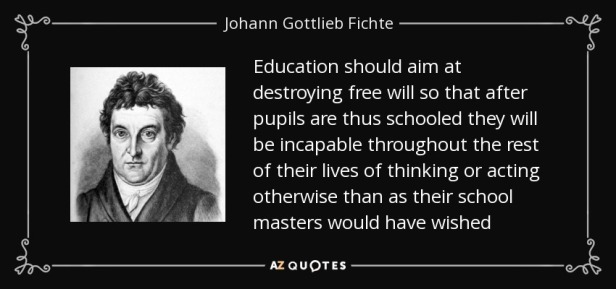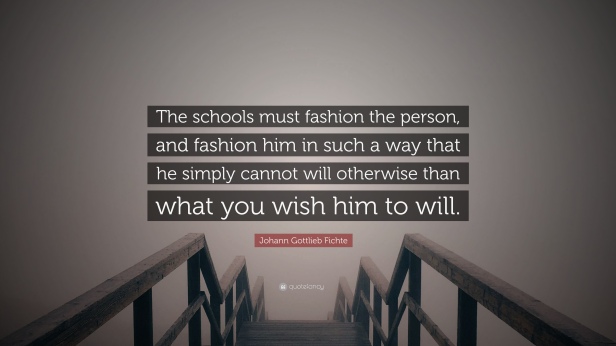In October of 1806 the Prussian army was routed by Napoleon’s forces in the battle of Jena, subjugating the kingdom to the French Empire for the next six years. Upon performing an autopsy of the event, authorities discovered, to their horror, that some of the Prussian infantrymen had been thinking for themselves instead of following orders. This sparked an intense national debate. One of the stars of these debates was a then little-known philosopher named Johann Gottlieb Fichte. Here are a couple of the most famous direct quotes from his writing.


He was a lovely guy, as you can see.
Up until this time, western schools employed the grammar-school model which was concerned with teaching children HOW to think, not WHAT to think, as I discussed briefly in Who Were the Proto Indo-Europeans?.
Over the next few years, the Prussian government began to implement a new state-run education system that was aimed at instilling a national identity in its pupils. Its stated goals were:
- Obedient soldiers
- Obedient workers
- Well-subordinated civil servants
- Well-subordinated clerks
- Citizens who thought alike on most issues
- National uniformity in thought, work, and deed
The reforms were largely successful and are considered by some historians to be the impetus of the German nationalist movement and the eventual unification of the German states in the 1870s.
As I mentioned in The Dumbing Down of the American Electorate, Americans suffer from a systemic lack of critical-thinking ability, and the education system has a lot to answer for.
The father of American education is considered to be the Secretary of the Massachusetts State Board of Education and US Congressman Horace Mann. He is quoted as saying: “The state is the father of children.” Fichte would be proud. Mann traveled to Prussia in 1843 to observe their public education system first hand. It was quickly implemented in Massachusetts, and then spread across the North. After the civil war, one of the main goals of reconstruction was to implement the system in the south.
A very important, yet often over-looked turning point in American national identity happened slowly in the mid 19th century. That is ‘The United States’ going from plural to singular. So people used to say: “The United States ARE…” But they now say: “The United States IS…” This was not an organic transition but was engineered through standardized teaching material. This transition reflects a much more significant trend in personal identity. People went from being citizens of their state, which happened to be part of a larger union, to being citizens of that union. Now it’s inconceivable that a state could secede from the union, but, in the 1860s, at least in the south, it was as natural as electing a new president. This was an intolerable situation for the oligarchs. They had to do something about it, and singularizing the union’s name was an effective first step.
Everyone learning the same ‘we’re the good guys’ narrative of US history, the pledge of allegiance, and the school flag pole were later Prussian-esque policies.
The Prussian model is now the standard all around the world. Many world governments sent delegates to Prussia in the 19th century to study this new mind-control innovation.
It is important to get to your subjects while they’re still young and their minds are malleable. You need to implement change incrementally so teachers and parents don’t ask too many questions. Now, by this late stage, parents don’t even realize their children are being indoctrinated, because they’ve been indoctrinated themselves.
Patriotic indoctrination is a key to maintaining plutocracy. National identity and personal identity must be inseparable. People must know the official narrative of their national history. They must think that their heritage is righteous. This is easily done, because it reinforces the natural longing for one’s in-group to be inherently better than perceived out-groups. With this reassurance in the back of their minds, even if it’s not openly discussed, people all agree that the lives of foreigners don’t really matter.
People can cry over Americans killed in the latest school shooting, but, when confronted with the facts of hundreds of thousands of civilians slaughtered in Iraq, people can dismiss it as ‘too far away to really hit-home.’ People who are instinctively against killing other human beings, can support the most heinous state-sponsored mass murder imaginable.
To quote Noam Chomsky: “The smart way to keep people passive and obedient is to strictly limit the spectrum of acceptable opinion, but allow very lively debate within that spectrum.” People must subconsciously understand the parameters of the spectrum so the illusion of a free-and-open society can be maintained.
For example: every good Democrat knows we must be confrontational with Russia, and every good Republican knows we must be confrontational with Iran, but, conveniently for the oligarchs who set American policy, everyone agrees that diplomacy is unacceptable. No one really thinks we should try to get along with other groups of people who share our planet. And that’s all that really matters for the powers that be.
At the end of the day, people think they’re free just because they can argue over which country they should hate the most.
Republicans think that private health insurance companies should be able to deny coverage due to pre-existing conditions, but people shouldn’t be required to buy insurance. Democrats say there should be no pre-existing conditions, but that everyone must buy insurance. Either way, insurance companies are still parasites who pocket 20% of all money spent on medicine, despite providing no medical good or service. People can have very lively debates on these small details, but insurance companies are still laughing all the way to the bank, and America still doesn’t have universal healthcare like every other developed country in the world, and Americans still spend more money on healthcare than any other country, and they still get worse outcomes.
An unfortunate element of human psychology that the Prussian model is more than happy to take advantage of is cognitive dissonance. People have a nice bed a pre-approved beliefs to fall back on, so if ever they’re exposed to contradictory information and start to feel uncomfortable, they are socially encouraged to disregard the new information, no matter how factual it is. It is easy for the mind to disregard contradictory information, because it treats beliefs like they are precious possessions. And if one’s friends and families have the same base beliefs, the path of least resistance is the status quo. Heaven forbid someone should call you a ‘conspiracy theorist.’
People are more easily controlled than they realize. All the state needs is standardized education and a compliant media, and people will play along to get along. Look deep in yourself. Look at all the beliefs you take for granted and have never questioned. Seriously analyze why it is you believe those things. Is it because you’ve taken an objective look at all available data and have come to the most likely conclusion, or is it because you were taught that as a kid and have never thought twice about it?

Compulsory Education
LikeLike